小升初介词专用At for on in 的区别和用法
- 格式:doc
- 大小:115.50 KB
- 文档页数:17
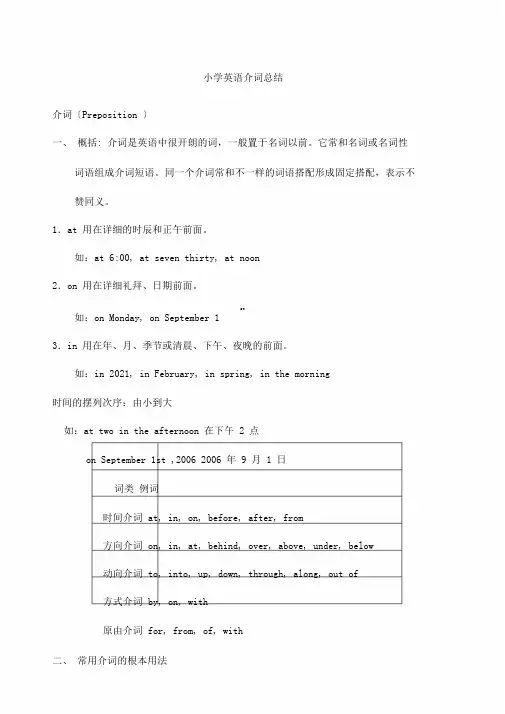
小学英语介词总结介词〔Preposition 〕一、概括: 介词是英语中很开朗的词,一般置于名词以前。
它常和名词或名词性词语组成介词短语。
同一个介词常和不一样的词语搭配形成固定搭配,表示不赞同义。
1.at 用在详细的时辰和正午前面。
如:at 6:00, at seven thirty, at noon2.on 用在详细礼拜、日期前面。
st如:on Monday, on September 13.in 用在年、月、季节或清晨、下午、夜晚的前面。
如:in 2021, in February, in spring, in the morning时间的摆列次序:由小到大如:at two in the afternoon 在下午 2 点on September 1st ,2006 2006 年 9 月 1 日词类例词时间介词 at, in, on, before, after, from方向介词 on, in, at, behind, over, above, under, below动向介词 to, into, up, down, through, along, out of方式介词 by, on, with原由介词 for, from, of, with二、常用介词的根本用法at ①表示时间: I go to school at seven every day 我每日清晨 7 点去上学。
②表示在某一详细地址: He is standing at the bus stop 他站在公共汽车站。
③表示动作的方向、目标: Let me have a look at the picture让我看看这幅图。
④用于某些固定搭配: at once 马上、马上 at last 最后at the same time 同时at first 开始时not at all 一点也不about ①表示大概时间: I's about six o'clock now.此刻大概6 点钟了。
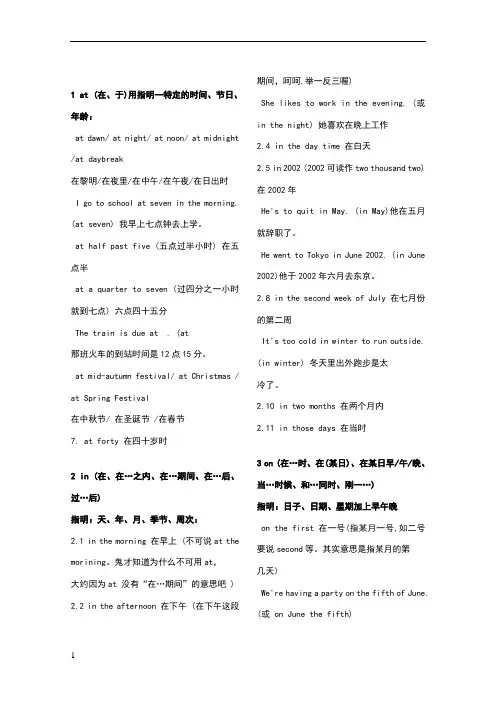
1 at (在、于)用指明一特定的时间、节日、年龄:at dawn/ at night/ at noon/ at midnight /at daybreak在黎明/在夜里/在中午/在午夜/在日出时I go to school at seven in the morning. (at seven) 我早上七点钟去上学。
at half past five (五点过半小时) 在五点半at a quarter to seven (过四分之一小时就到七点) 六点四十五分The train is due at . (at那班火车的到站时间是12点15分。
at mid-autumn festival/ at Christmas / at Spring Festival在中秋节/ 在圣诞节 /在春节7. at forty 在四十岁时2 in (在、在…之内、在…期间、在…后、过…后)指明:天、年、月、季节、周次:2.1 in the morning 在早上 (不可说at the morining。
鬼才知道为什么不可用at,大约因为at 没有“在…期间”的意思吧 ) 2.2 in the afternoon 在下午 (在下午这段期间,呵呵,举一反三喔)She likes to work in the evening. (或in the night) 她喜欢在晚上工作2.4 in the day time 在白天2.5 in 2002 (2002可读作two thousand two) 在2002年He's to quit in May. (in May)他在五月就辞职了。
He went to Tokyo in June 2002. (in June 2002)他于2002年六月去东京。
2.8 in the second week of July 在七月份的第二周It's too cold in winter to run outside. (in winter) 冬天里出外跑步是太冷了。
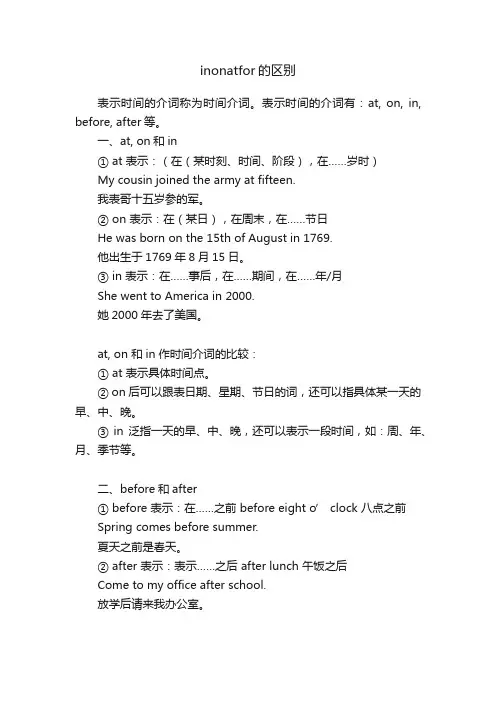
inonatfor的区别表示时间的介词称为时间介词。
表示时间的介词有:at, on, in, before, after等。
一、at, on和in① at 表示:(在(某时刻、时间、阶段),在……岁时)My cousin joined the army at fifteen.我表哥十五岁参的军。
② on 表示:在(某日),在周末,在……节日He was born on the 15th of August in 1769.他出生于1769年8月15日。
③ in 表示:在……事后,在……期间,在……年/月She went to America in 2000.她2000年去了美国。
at, on 和in 作时间介词的比较:① at 表示具体时间点。
② on 后可以跟表日期、星期、节日的词,还可以指具体某一天的早、中、晚。
③ in 泛指一天的早、中、晚,还可以表示一段时间,如:周、年、月、季节等。
二、before和after① before 表示:在……之前before eight o’ clock 八点之前Spring comes before summer.夏天之前是春天。
② after 表示:表示……之后 after lunch 午饭之后Come to my office after school.放学后请来我办公室。
表示做某事的方法、手段的介词有by, with, in, at, on。
一、byby表示:用,以,靠,通过……方式。
by表示手段时后接动作或制作方式。
“by + 交通工具”表示交通方式。
by bike 骑车 by bus 坐公车 by taxi 搭出租by train 坐火车 by ship 乘船 by air 坐飞机Linda usually goes to work by subway.琳达通常做地铁上班。
She makes a living by teaching.她考教书谋生。
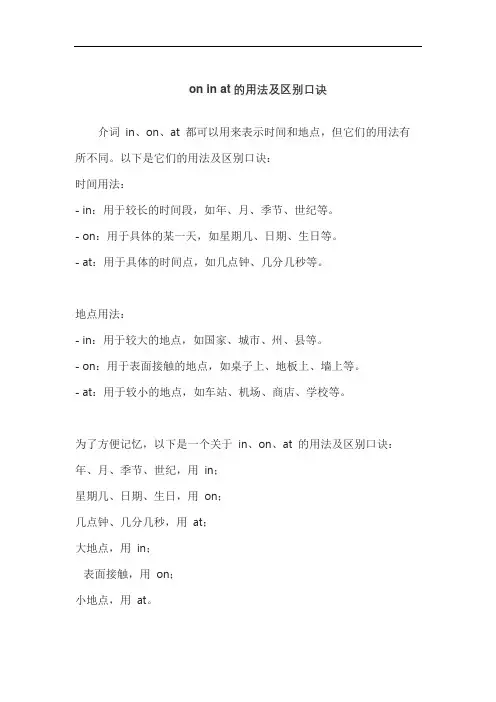
on in at的用法及区别口诀
介词in、on、at 都可以用来表示时间和地点,但它们的用法有所不同。
以下是它们的用法及区别口诀:
时间用法:
- in:用于较长的时间段,如年、月、季节、世纪等。
- on:用于具体的某一天,如星期几、日期、生日等。
- at:用于具体的时间点,如几点钟、几分几秒等。
地点用法:
- in:用于较大的地点,如国家、城市、州、县等。
- on:用于表面接触的地点,如桌子上、地板上、墙上等。
- at:用于较小的地点,如车站、机场、商店、学校等。
为了方便记忆,以下是一个关于in、on、at 的用法及区别口诀:年、月、季节、世纪,用in;
星期几、日期、生日,用on;
几点钟、几分几秒,用at;
大地点,用in;
表面接触,用on;
小地点,用at。
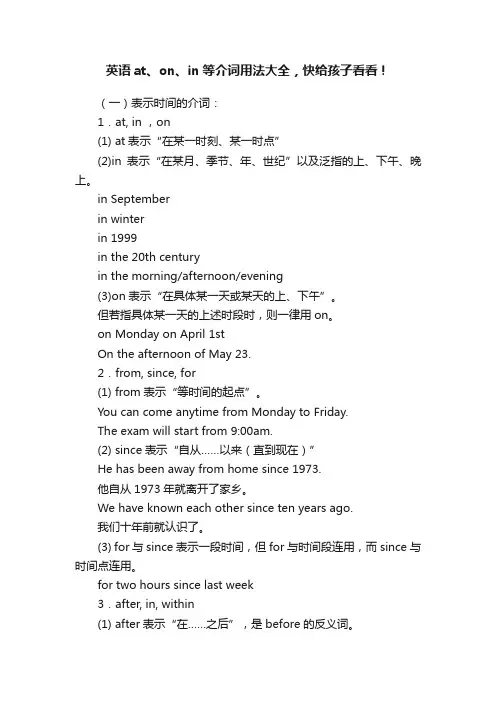
英语at、on、in等介词用法大全,快给孩子看看!(一)表示时间的介词:1.at, in ,on(1) at表示“在某一时刻、某一时点”(2)in表示“在某月、季节、年、世纪”以及泛指的上、下午、晚上。
in Septemberin winterin 1999in the 20th centuryin the morning/afternoon/evening(3)on表示“在具体某一天或某天的上、下午”。
但若指具体某一天的上述时段时,则一律用on。
on Monday on April 1stOn the afternoon of May 23.2.from, since, for(1) from表示“等时间的起点”。
You can come anytime from Monday to Friday.The exam will start from 9:00am.(2) since表示“自从……以来(直到现在)”He has been away from home since 1973.他自从1973年就离开了家乡。
We have known each other since ten years ago.我们十年前就认识了。
(3) for 与since表示一段时间,但for与时间段连用,而since与时间点连用。
for two hours since last week3.after, in, within(1) after表示“在……之后”,是before的反义词。
We’ll hold a party after dinner.晚餐后我们将举办晚会。
He got a cancer and died after a year.他患了癌症,一年后去世了(2) within“在……时间之内”I can finish it within an hour.我不需一小时就可把它做完。
(3) in 后面接过去的时间点表过去,若后面接一段时间,则表示“在……时间之后”I was born in 1983.我出生于1983年。

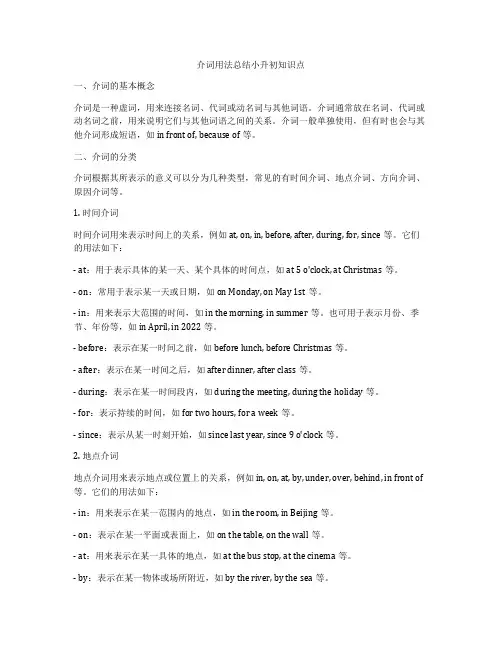
介词用法总结小升初知识点一、介词的基本概念介词是一种虚词,用来连接名词、代词或动名词与其他词语。
介词通常放在名词、代词或动名词之前,用来说明它们与其他词语之间的关系。
介词一般单独使用,但有时也会与其他介词形成短语,如in front of, because of等。
二、介词的分类介词根据其所表示的意义可以分为几种类型,常见的有时间介词、地点介词、方向介词、原因介词等。
1. 时间介词时间介词用来表示时间上的关系,例如at, on, in, before, after, during, for, since等。
它们的用法如下:- at:用于表示具体的某一天、某个具体的时间点,如at 5 o'clock, at Christmas等。
- on:常用于表示某一天或日期,如on Monday, on May 1st等。
- in:用来表示大范围的时间,如in the morning, in summer等。
也可用于表示月份、季节、年份等,如in April, in 2022等。
- before:表示在某一时间之前,如before lunch, before Christmas等。
- after:表示在某一时间之后,如after dinner, after class等。
- during:表示在某一时间段内,如during the meeting, during the holiday等。
- for:表示持续的时间,如for two hours, for a week等。
- since:表示从某一时刻开始,如since last year, since 9 o'clock等。
2. 地点介词地点介词用来表示地点或位置上的关系,例如in, on, at, by, under, over, behind, in front of 等。
它们的用法如下:- in:用来表示在某一范围内的地点,如in the room, in Beijing等。

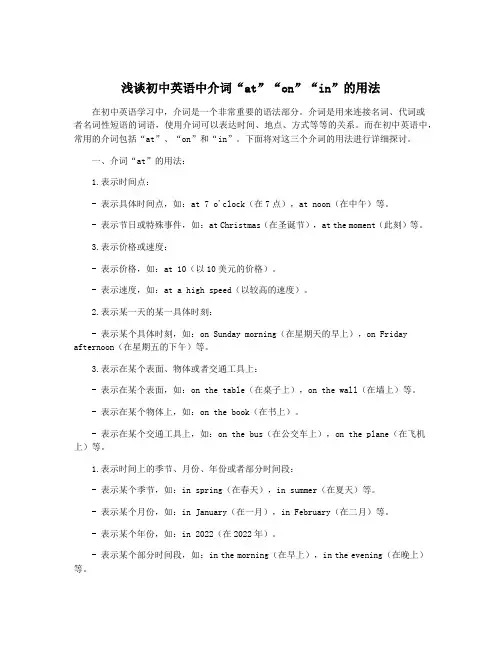
浅谈初中英语中介词“at”“on”“in”的用法在初中英语学习中,介词是一个非常重要的语法部分。
介词是用来连接名词、代词或者名词性短语的词语,使用介词可以表达时间、地点、方式等等的关系。
而在初中英语中,常用的介词包括“at”、“on”和“in”。
下面将对这三个介词的用法进行详细探讨。
一、介词“at”的用法:1.表示时间点:- 表示具体时间点,如:at 7 o'clock(在7点),at noon(在中午)等。
- 表示节日或特殊事件,如:at Christmas(在圣诞节),at the moment(此刻)等。
3.表示价格或速度:- 表示价格,如:at 10(以10美元的价格)。
- 表示速度,如:at a high speed(以较高的速度)。
2.表示某一天的某一具体时刻:- 表示某个具体时刻,如:on Sunday morning(在星期天的早上),on Friday afternoon(在星期五的下午)等。
3.表示在某个表面、物体或者交通工具上:- 表示在某个表面,如:on the table(在桌子上),on the wall(在墙上)等。
- 表示在某个物体上,如:on the book(在书上)。
- 表示在某个交通工具上,如:on the bus(在公交车上),on the plane(在飞机上)等。
1.表示时间上的季节、月份、年份或者部分时间段:- 表示某个季节,如:in spring(在春天),in summer(在夏天)等。
- 表示某个月份,如:in January(在一月),in February(在二月)等。
- 表示某个年份,如:in 2022(在2022年)。
- 表示某个部分时间段,如:in the morning(在早上),in the evening(在晚上)等。
2.表示在某个地点或区域:- 表示在某个地点,如:in Beijing(在北京),in the park(在公园)等。
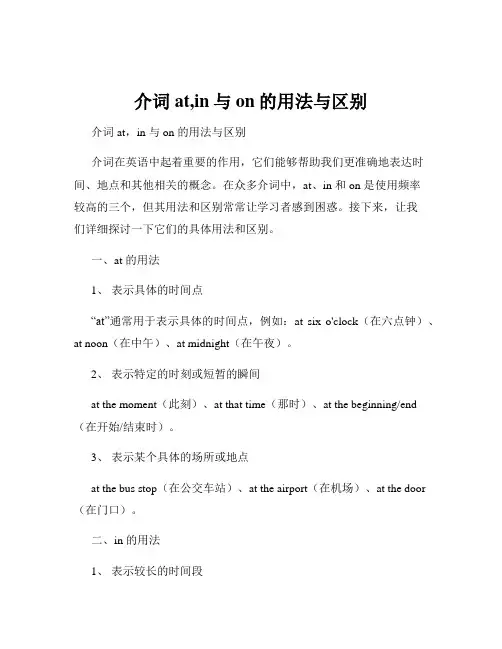
介词at,in与on的用法与区别介词 at,in 与 on 的用法与区别介词在英语中起着重要的作用,它们能够帮助我们更准确地表达时间、地点和其他相关的概念。
在众多介词中,at、in 和 on 是使用频率较高的三个,但其用法和区别常常让学习者感到困惑。
接下来,让我们详细探讨一下它们的具体用法和区别。
一、at 的用法1、表示具体的时间点“at”通常用于表示具体的时间点,例如:at six o'clock(在六点钟)、at noon(在中午)、at midnight(在午夜)。
2、表示特定的时刻或短暂的瞬间at the moment(此刻)、at that time(那时)、at the beginning/end (在开始/结束时)。
3、表示某个具体的场所或地点at the bus stop(在公交车站)、at the airport(在机场)、at the door (在门口)。
二、in 的用法1、表示较长的时间段in the morning/afternoon/evening(在上午/下午/晚上)、in May(在五月)、in 2023(在 2023 年)、in summer/winter(在夏天/冬天)。
2、表示在某个较大的空间或范围之内in the city(在城市里)、in the country(在乡村)、in the room(在房间里)。
三、on 的用法1、表示具体的日期on Monday(在星期一)、on May 1st(在五月一日)、on Christmas Day(在圣诞节)。
2、表示在某一天或某一天的上午、下午、晚上on Sunday morning(在星期天上午)、on the evening of June 1st (在六月一日的晚上)。
3、表示在某个表面上on the table(在桌子上)、on the wall(在墙上)。
四、at,in 与 on 在时间表达上的区别1、时间点用“at”例如:“at 7:30”(在七点半),“at dawn”(在黎明)。
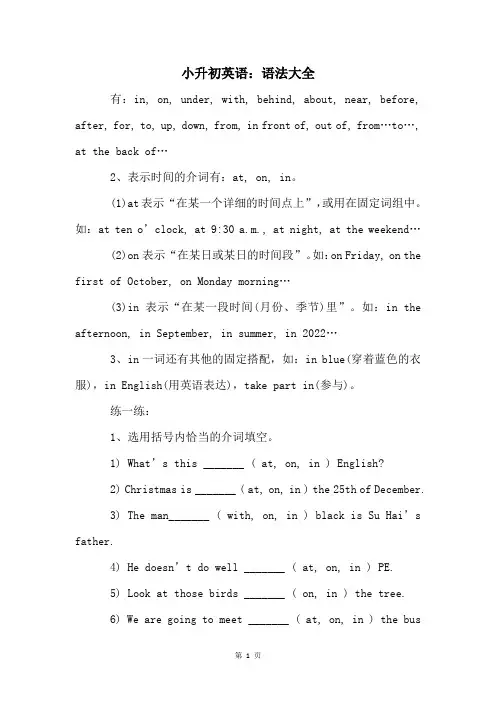
小升初英语:语法大全有:in, on, under, with, behind, about, near, before, after, for, to, up, down, from, in front of, out of, from…to…, at the back of…2、表示时间的介词有:at, on, in。
(1)at表示“在某一个详细的时间点上”,或用在固定词组中。
如:at ten o’clock, at 9:30 a.m., at night, at the weekend… (2)on表示“在某日或某日的时间段”。
如:on Friday, on the first of October, on Monday morning…(3)in表示“在某一段时间(月份、季节)里”。
如:in the afternoon, in September, in summer, in 2022…3、in一词还有其他的固定搭配,如:in blue(穿着蓝色的衣服),in English(用英语表达),take part in(参与)。
练一练:1、选用括号内恰当的介词填空。
1) What’s this _______ ( at, on, in ) English?2) Christmas is _______ ( at, on, in ) the 25th of December.3) The man_______ ( with, on, in ) black is Su Hai’s father.4) He doesn’t do well _______ ( at, on, in ) PE.5) Look at those birds _______ ( on, in ) the tree.6) We are going to meet _______ ( at, on, in ) the busstop _______ ( at, on, in ) half past ten.7) Is there a cat _______ ( under, behind, in ) the door?8) Helen’s writing paper is _______ ( in, in front of ) her computer.9) We live _______ ( at, on, in ) a new house now.10) Does it often rain _______ ( at, on, in ) spring there?2、圈出以下句子中运用不恰当的介词,并将正确的答案写在横线上。
介词at,on,in用法详解2020小升初英语小学英语是激发学生的学英语兴趣,那么只要他觉得学英语很好玩,就基本上完成了小学阶段英语学习的一大半任务。
小偏整理了介词at, on, in用法详解2020小升初英语,欢迎参考借鉴。
介词at, on, in用法详解2020小升初英语选用介词at的场合介词at主要可用于以下几种场合,家长需提醒孩子特别注意的是at在固定短语或习惯搭配中的使用。
用于钟点前·at ten o’clock·at a quarter to six用于时刻前·at noon/night/midnight (半夜)·at sunrise (日出时)·at dusk (黄昏)·at dawn/daybreak (黎明)eg: We will leave at day break. 我们将在黎明时动身。
用于表示进餐时间。
如:·at breakfast/lunch/supper (在早餐时/午餐时/晚餐时)用于表示年龄时。
如:·at 14 (=at the age of 14在14岁)eg: He left home at the age of 16. 他十六岁离开了家。
用于一些固定短语或习惯搭配中。
如:·at Christmas 在圣诞节·at New Year·at Thanksgiving (感恩节)·at the moment/ at that time·at this time of day·at a bad time of year·at first (起初)·at last (终于)选用介词on的场合用于星期、日期(包括该天的各部分)前·on Sundays/weekdays·on Monday morning / afternoon / evening【温馨提示】“在周末”既可以说at weekends,也可以说on weekends。
介词in,on.at,for.with,by,of的基本用法介词用法知多少介词是英语中最活跃的词类之一。
同一个汉语词汇在英语中可译成不同的英语介词。
例如汉语中的“用”可译成:(1)用英语(in English);(2)用小刀(with a knife);(3)用手工(by hand);(4)用墨水(in ink)等。
所以,千万不要以为记住介词的一两种意思就掌握了这个介词的用法,其实介词的用法非常广泛,搭配能力很强,越是常用的介词,其含义越多。
下面就简单介绍几组近义介词的用法及其搭配方法。
一. in, to, on和off在方位名词前的区别1. in表示A地在B地范围之内。
如:Taiwan is in the southeast of China.2. to表示A地在B地范围之外,即二者之间有距离间隔。
如:Japan lies to the east of China.3. on表示A地与B地接壤、毗邻。
如:North Korea is on the east of China.4. off表示“离……一些距离或离……不远的海上”。
如:They arrived at a house off the main road.New Zealand lies off the eastern coast of Australia.二. at, in, on, by和through在表示时间上的区别1. at指时间表示:(1)时间的一点、时刻等。
如:They came home at sunrise (at noon, at midnight, at ten o’clock, at daybreak, at dawn). (2)较短暂的一段时间。
可指某个节日或被认为是一年中标志大事的日子。
如:He went home at Christmas (at New Y ear, at the Spring Festival, at night).2. in指时间表示:(1)在某个较长的时间(如世纪、朝代、年、月、季节以及泛指的上午、下午或傍晚等)内。
一. in,on 在方向名词前的差别1.in 表示 A 地在 B 地范以内。
如:Taiwan is in the southeast of China.2.on 表示 A 地与 B 地接壤、毗。
如:North Korea is on the east of China.※二 . at, in, on在表示时间上的差别1.at 指表示:(1)的一点、刻等。
如:They came home at sunrise(at noon, at midnight, at ten o, at’clock daybreak, at dawn ).(2)短的一段。
可指某个日或被是一年中志大事的日子。
如:He went home at Christmas(at New Year, at the Spring Festival,at night ) .2.in 指表示:(1)在某个的(如世、朝代、年、月、季以及泛指的上午、下午或夜晚等)内。
如:in 2004, in March, in spring, in the morning, in the evening, etc(2)在一段以后。
一般状况下,用于未来,瞬,意“在⋯⋯此后”。
如:He will arrive in two hours.延性,in 意“在⋯⋯以内”。
如:These products will be produced in a month.注意:after 用于未来时间也指一段时间以后,但后来的时间是“一点”,而不是“一段”。
如:He will arrive after two o’clock.3.on 指时间表示:(1)详细的时间和一个特定的时间,如某日、某节日、礼拜几等。
如:On Christmas Day(On May 4th), there will be a celebration.(2)在某个特定的清晨、下午或夜晚。
如:He arrived at 10 o’clock on the night of the 5th.(3)准时,准时。
⼩升初介词专⽤At__for_on_in_的区别和⽤法Atforonin的区别和⽤法早、午、晚要⽤in例:inthemorning在早上intheafternoon在下午intheevening在晚上intheday在⽩天at黎明、午、夜、点与分例:atdawn,atdaybreak在黎明时候atnoon在中午atnight在夜间atmidnight在午夜以上短语都不⽤冠词atsixo''clock在6点钟at7:30(seventhirty)在7点半athalfpasteleven在11点半atninefifteen在9点15分attenthirtya.m.在上午10点30分也可以写成seventofive5点差7分(半⼩时以上) fiveminutesaftertwo2点过5分ataquartertotwo1点45分attheweekend在周末年、⽉、年⽉、季节、周即在"来年",在"某⽉",在"某年某⽉"(但在某年某⽉某⽇则⽤on),在四季,在第⼏周等都要⽤in。
例;in1986在1986年in1927在1927年inApril在四⽉inMarch在三⽉inDecember19861986年12⽉inJulyl9831983年7⽉inspring在春季insummer在夏季inautumn在秋季inwinter在冬季inthefistweekofthissemester这学期的第⼀周inthethirdweek在第三周阳光、灯、影、⾐、冒in,即在阳光下,在灯下,在树阴下,穿⾐、着装、冒⾬等都要⽤in。
例:Don''treadindimlight.切勿在暗淡的灯光下看书。
Theyarereviewingtheirlessonsinthebrightlight.他们在明亮的灯光下复习功课。
Theyaresittingintheshadeofatree.他们坐在树阴下乘凉。
oninat的区别和用法口诀摘要:一、前言二、on、in、at的词义及用法概述1.on2.in3.at三、on、in、at的固定搭配及例句1.on2.in3.at四、总结正文:【前言】英语中,介词的用法一直以来都是学习者需要攻克的难题之一。
on、in、at作为英语中最为常用的介词,其用法和意义的区别更是让人头疼。
本文将对这三个介词的区别和用法进行详细阐述,帮助大家更好地理解和运用。
【on、in、at的词义及用法概述】1.onon表示在某个物体或者表面的上面或者紧贴着。
例如:- She put a book on the table.(她把书放在桌子上。
)- He is sitting on the bench.(他坐在长凳上。
)2.inin表示在某个地方、容器或者空间内部。
例如:- She put the keys in the drawer.(她把钥匙放进了抽屉里。
)- He is inside the house.(他在房子里。
)3.atat表示在某个地点或者位置的外部。
例如:- He is at the library.(他在图书馆。
)- We are at the same school.(我们在同一所学校。
)【on、in、at的固定搭配及例句】1.on- on time:准时- Example: Please arrive on time for the meeting.(请准时参加会议。
)- on the phone:打电话- Example: I am on the phone with my friend.(我正在给朋友打电话。
)2.in- in the morning/afternoon/evening:在早晨/下午/晚上- Example: I usually exercise in the morning.(我通常在早上锻炼。
)- in English/Chinese:用英语/中文- Example: She speaks English fluently.(她英语讲得很流利。
in和at和on用法比较在英语中,in, at和on这三个介词都有着相对固定的用法。
虽然它们的意思很相似,但是它们有着不同的上下文环境和用法。
正确认识它们的用法,能够帮助我们正确地表达自己的意思。
下面将详细介绍in, at和on的用法比较,希望对大家有所帮助。
1. in的用法(1)在某个范围内:in用在表达某人或某物处于概念上的“范围”内的情况。
例如: - I learned English in school.(我在学校中学习了英语。
)- They live in New York City.(他们住在纽约市。
)- I put my shoes in the closet.(我把鞋子放在了壁橱里。
)(2)时间单位:in用在表示一个“时间单位”的情况。
例如:(3)某个地方的内部:in用在表示某个地方的内部。
例如:- The meeting is at 2 pm.(会议在下午2点举行。
)- We have to leave at 7 am.(我们必须在早上7点离开。
)- The movie starts at 7:30 pm.(电影7:30开始放映。
)(3)表示一个状态的瞬间:at用在表示一个状态的瞬间的情况。
例如:总结虽然in, at和on有些许相似,但是它们的用法有所不同。
in表示“概念上的范围”、“时间单位”、“某个地方的内部”、“状态”等情况;at表示“某个具体的地方”、“时间”、“状态的瞬间”等情况;on表示“某个具体的表面”、“日期”、“时间”等情况。
如果我们能够正确地使用它们,我们就能更加清楚地表达自己的意思,避免出现歧义的情况。
At for on in 的区别和用法早、午、晚要用in例:in the morning 在早上in the afternoon 在下午in the evening 在晚上in the day 在白天at黎明、午、夜、点与分例: at dawn, at daybreak 在黎明时候at noon 在中午at night 在夜间at midnight 在午夜以上短语都不用冠词at six o'clock 在6点钟at 7:30 (seven thirty) 在7点半at half past eleven 在11点半at nine fifteen 在9点15分at ten thirty a.m. 在上午10点30分也可以写成seven to five 5点差7分(半小时以上)five minutes after two 2点过5分at a quarter to two 1点45分at the weekend 在周末年、月、年月、季节、周即在"来年",在"某月",在"某年某月" (但在某年某月某日则用on),在四季,在第几周等都要用in。
例;in 1986 在1986年in 1927 在1927年in April 在四月in March 在三月in December 1986 1986年12月in July l983 1983年7月in spring 在春季in summer 在夏季in autumn 在秋季in winter 在冬季in the fist week of this semester 这学期的第一周in the third week 在第三周阳光、灯、影、衣、冒in,即在阳光下,在灯下,在树阴下,穿衣、着装、冒雨等都要用in。
例:Don't read in dim light. 切勿在暗淡的灯光下看书。
They are reviewing their lessons in the bright light. 他们在明亮的灯光下复习功课。
They are sitting in the shade of a tree. 他们坐在树阴下乘凉。
a prisoner in irons 带着镣铐的囚犯He went in the rain to meet me at the station. 他冒雨到车站去接我。
The poor dressed (clothed) in rags in old society. 旧社会穷人们衣衫褴褛.以及:in the bright sunlight 在明亮的阳光下a merchant in disguise 乔装的商人the woman in white (black, red, yellow) 穿着白(黑、红、黄)色衣服的妇女in uniform 穿着制服in mourning 穿着丧服in brown shoes 穿着棕色鞋in his shirt sleeves 穿着衬衫将来时态in...以后例: They will come back in 10 days. 他们将10天以后回来。
I'll come round in a day or two. 我一两天就回来。
We'll be back in no time. 我们一会儿就回来。
Come and see me in two days' time. 两天后来看我。
(从现在开始) after... (从过去开始)小处at大处in例:Li and I arrived at Heishan county safe and sound, all is well. Don't worry. 李和我平安地到达黑山县,一切很好,勿念。
I live in a great city (big city), my sister lives at a small town while my parents live at a village. 我住在大城市,我姐姐住在一个小城镇,而我的父母则住在农村。
I'm in Liaoning, at Anshan. 我住在辽宁省鞍山市.有形with无形by,语言、单位、材料in例:The workers are paving a road with stone. 工人们正用石子铺路。
(有形)The teacher is correcting the paper with a new pen. 这位教师正用一支新笔批改论文。
(有形)"Taking Tiger Mountain by Strategy" is a good opera. <<智取威虎山>>是-出好戏。
(无形)The product is separated by distilation into gasoline and gas oil. 这种产品是用蒸馏分离出气油和粗柴油。
(表示方式、手段、方法--无形)I really can't express my idea in English freely in-deed.我确实不能用英语流利地表达我的思想。
(表示某种语言用in)I wrote a novel in Russian. 我用俄语写了一本小说。
(同上)The kilometer is the biggest unit of length in the metric system.公里是米制中最长的长度单位。
(表示度、量、衡单位的用in )The length is measured in meter, kilometre, and centimetre. 长度是以米、公里、厘米为单位来计算的。
(同上)This board was cast in bronze not in gold. 这个牌匾是铜铸的,不是金铸的。
特征、方面与方式、心情、成语惯用in特征或状态:例: The Democratic Party was then in power. 那时民主党执政。
They found the patient in a coma. 他们发现病人处于昏迷状态。
He has not been in good health for some years. 他几年来身体一直不好。
Many who came in despair went away in hope. 许多人带着绝望情绪而来,却满怀希望而去。
The house was in ruins. 这房屋成了废墟。
The poor girl was in tears. 这个贫苦女孩泪流满面。
Her clothes were in rags. 她的衣跟穿破了。
His shoes were in holes. 他的鞋穿出窟窿了。
I only said it in fun. 我说这话只是开玩笑的。
She spoke in grief rather than in anger. 与其说她讲得很气愤,不如说她讲得很伤心。
还有一些短语也用in,如:in jest 诙谐地,in joke 开玩笑地,in spite 恶意地,in fairness 公正地,in revenge 报复, in mercy 宽大,in sorrow 伤心地等。
His mind was in great confusion. 他脑子里很乱。
Today everybody is in high spirits and no one is in low ebb. 今天大家都兴高采烈,没有一个情绪低落的。
She and her classmates are in flower ages. 她和她的同学都正值妙龄。
The compaign was in full swing. 运动正值高潮中。
方面:例:we accepted the item in principle. 我们在原则上接受了这个条款。
They are never backward in giving their views. 他们从来不怕发表自己的意见。
The backward area has achieved self-sufficient in grain. 这个落后的地区在粮食方面已能自给。
A good teacher must be an example in study. 一个好的教师必须是学习的模范。
方式:例:All the speeches were taken down in shorthand. 所有报告都用速记记录下来了。
The Party has always educated us in the spirit of patriotism and internationalism. 党一贯以爱国主义和国际主义精神教育我们。
如下成语惯用in例如:in all 总计in advance 事前in the meantime 与此同时in place 适当地in hopes of(或in the hope of) 怀着.......希望in connection with 和……有关in contact with 和……联系in addition to 除......以外in case of 倘若,万一in conflict with 和......冲突in force 有效的,大批in depth 彻底地in regard to 关于in the neighborhood of 大约、邻近in retrospect 回顾,一想起in behalf of 代表......利益in the least 一点,丝毫in alarm 惊慌、担心in the opinion of 据……见解in the long run 从长远说来in one's opinion 在……看来in word 口头上in a word 总之in vain 无益地, 白白地in case 如果,万一,以防in detail 详细地in haste 急急忙忙地in conclusion 总之in spite of 尽管in other words... 换句话说in return 作为回报in the name of 以......名义be confident in 对......有信心be interested in 对......感兴趣in doubt 怀疑in love 恋爱中in debt 负债in fun (jest、joke) 玩笑地in hesitation 犹豫不决in wonder 在惊奇中in public (secret) 公开他(秘密地)in a good humour 心情(情绪)好"介词at、to表方向,攻击、位置、善、恶、分"。